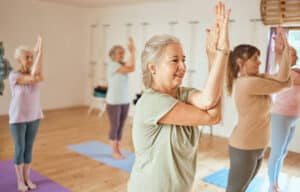As we age, maintaining our balance becomes an increasingly important aspect of our overall health and independence. For many of us over the age of 60, the challenge of keeping steady on our feet can significantly impact our quality of life. At Carolina Brain Center, under my guidance as a Chiropractic Neurologist, we understand the complexities of balance and the multifaceted approach required to improve it. This blog post is dedicated to unraveling the intricacies of balance in older adults. We’ll explore effective strategies, essential exercises, and the critical role nutrition plays in supporting your neurological health. Additionally, we’ll delve into how regular appointments with a Chiropractic Neurologist can enhance your stability and ensure a more secure, confident gait. Whether you’re looking to enhance your balance through practical exercises or seeking to understand the underlying factors that affect stability, this post is your guide to a firmer footing in your golden years.
Understanding Balance in Older Adults
Balance is a complex mechanism that relies on the seamless integration of several body systems, including the vestibular system (inner ear), proprioception (sense of body position), and vision, to help us navigate our environment safely and effectively. As we age, changes in these systems can compromise our balance. Reduced muscle strength, slower reflexes, and conditions such as vertigo or neuropathy can further challenge our stability. Understanding these factors is the first step towards addressing balance issues. At Carolina Brain Center, we focus on identifying the root causes of balance decline, empowering our patients with the knowledge to tackle these challenges head-on.
The Impact of Nutrition on Balance
Nutrition plays a pivotal role in maintaining and improving balance. Certain nutrients are essential for neurological health and can directly impact your stability. For instance, vitamin D is crucial for muscle function and bone health, while magnesium supports nerve function, and omega-3 fatty acids contribute to brain health. Incorporating a diet rich in these nutrients can help mitigate balance issues. Foods like fatty fish, leafy greens, nuts, and seeds are excellent sources. Moreover, staying hydrated and limiting intake of alcohol and caffeine can also support better balance. At our clinic, we often discuss nutritional strategies as part of a comprehensive approach to improving balance and overall well-being.
Effective Strategies for Improving Balance
Improving balance involves more than just physical exercises; it encompasses a holistic approach that includes mental stimulation, nutritional adjustments, and environmental modifications. Physical activities such as Tai Chi, yoga, and strength training are particularly beneficial for enhancing balance and flexibility. These activities not only improve muscle strength and coordination but also encourage mindfulness and concentration, which are vital for stability. Mental exercises that challenge cognitive function can also contribute to better balance by improving reaction times and spatial awareness. Additionally, simple home modifications, like securing rugs and improving lighting, can significantly reduce the risk of falls. At Carolina Brain Center, we tailor our recommendations to each individual’s needs, ensuring that strategies for improving balance are both effective and achievable.

Exercises to Improve Balance
One of the most direct ways to combat balance issues is through targeted exercises designed to strengthen the muscles that keep you upright and enhance your sensory systems. Here are a few exercises that can be safely performed by older adults:
- Single-Leg Stance: Stand behind a sturdy chair, using it for support if needed. Lift one foot off the ground and balance on the other for as long as you can, up to 30 seconds. Repeat with the other leg. This exercise improves leg strength and stability.
- Heel-to-Toe Walk: Place the heel of one foot directly in front of the toes of the opposite foot as if walking on a tightrope. Take 20 steps forward. This exercise enhances coordination and proprioception.
- Chair Squats: Stand in front of a chair with feet shoulder-width apart. Lower your body to sit back down slowly, then stand back up. Repeat 10-15 times. This strengthens your leg muscles, crucial for good balance.
Safety is paramount, so always perform exercises in a hazard-free area and consider having someone nearby if you’re at risk of falling. Progressively increasing the difficulty of these exercises, such as performing them with less support, can continue to challenge and improve your balance over time.
Regular Appointments with a Chiropractic Neurologist
Integrating regular visits to a Chiropractic Neurologist into your healthcare routine can significantly contribute to maintaining and improving balance. At Carolina Brain Center, our approach goes beyond simple balance exercises. Here’s what you can expect:
– Personalized Care Plans: We understand that each individual’s balance issues are unique. Through comprehensive assessments, we develop personalized care plans that address specific needs and goals.
– Neurological Health Assessments: Regular check-ups allow for ongoing monitoring of your neurological health, enabling timely adjustments to your treatment plan.
– Tailored Exercise Recommendations: Based on your specific condition, we recommend exercises that target your weaknesses and build on your strengths, ensuring a holistic approach to improving your balance.
Patients often report not just improvements in their balance but also in their overall sense of wellbeing. Success stories range from individuals regaining confidence in their mobility to significantly reducing their fall risk, underscoring the value of specialized care in managing balance issues.
Conclusion
The journey to improving balance in older adults is a multifaceted endeavor that encompasses understanding the complexities of balance, implementing effective strategies and exercises, optimizing nutrition, and engaging in regular appointments with a Chiropractic Neurologist. At Carolina Brain Center, we are committed to providing our patients with the comprehensive care and support they need to navigate this journey successfully. By adopting the strategies outlined in this post and seeking professional guidance, older adults can enhance their balance, reduce their risk of falls, and enjoy a more active, independent life.
We invite you to reach out to us to explore how we can tailor our approach to meet your unique needs and help you achieve a steadier, more confident stride into your golden years.
Your balance is not just a reflection of your physical health but a critical component of your independence and quality of life. Let’s take the steps together to ensure you stand strong, no matter what age you are.

